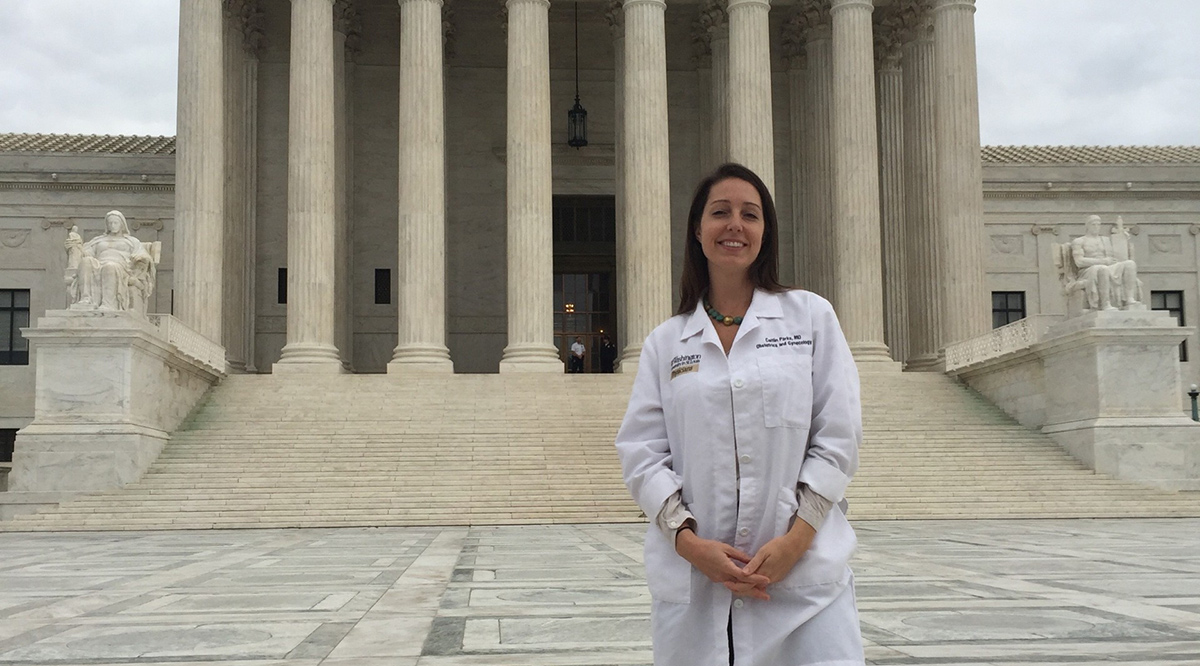
On June 30, 2022, just days after the U.S. Supreme Court Dobbs decision overturning Roe v. Wade, Indiana OB-GYN Caitlin Bernard, MD, performed an abortion on a 10-year-old Ohio girl who had been raped. A reporter who overheard Bernard share this experience with a colleague asked if the incident could be included in a news article, and Bernard agreed.
The fallout was swift. Bernard, 38, was accused of fabricating the rape story. The state’s attorney general launched an investigation against Bernard and accused her of failing to stay current on “professional theory or practice.” She was reprimanded and fined by her state’s medical licensing board for breaching the patient’s privacy, an allegation she and her employer, Indiana University Health, rejected. She was targeted by politicians and pundits and received threats to her personal safety.
She was also hailed as a hero. Many of Bernard’s colleagues across the United States quickly provided financial and moral support. Hundreds of doctors across Indiana signed an open letter defending Bernard’s actions.
Today, Bernard remains one of only two physicians still performing abortions in Indiana, where doing so is illegal except in cases of rape, incest, or lethal fetal anomalies, or to prevent a serious health risk to the pregnant person or to save their life.
Despite the difficulties involved, Bernard remains committed to advocating for reproductive rights — speaking out for patients and providers in the 21 states that have banned or severely restricted abortion access since the Dobbs decision. “There is something to be said for having a mission-aligned career that is much more than just a job, and I am very thankful for that.”
On Nov. 11, Bernard will speak at Learn Serve Lead: The AAMC Annual Meeting in Atlanta during a session titled “How can we confront the criminalization of medicine?” She recently spoke with AAMCNews about reproductive rights in the United States, her concerns for her patients and colleagues, and her commitment to doing what she believes is right despite personal and professional risks.
This interview has been edited for brevity and clarity.
Have the repercussions of your advocacy efforts made you question doing that work?
My understanding of our role as physicians is that advocacy is a huge part of what we do. It’s always been an important part of medicine but even more so now.
Whenever physicians are attacked or subjected to state investigations [as I was], it really undermines our ability to advocate for our patients and their health care needs. But I was not surprised by what happened because targeting physicians has certainly been a part of anti-abortion tactics. It’s also been part of the broader undermining of evidence-based science and medicine that we’ve unfortunately seen in our political system for a while now.
How have Indiana’s abortion laws changed since Roe v. Wade was overturned?
Like many other states, Indiana has a complete abortion ban, meaning it allows no abortions whatsoever with a few strict exceptions. Those exceptions are rape and incest, but not after 12 weeks gestation; lethal fetal anomalies, but only up to 22 weeks gestation; and pregnancy that seriously jeopardizes the health or life of the pregnant person. In the exception for the health or life of the patient, the condition has to be severe, and the criteria are very difficult for physicians to interpret.
The penalty for providing an abortion outside of those strict exceptions is a level 5 felony, jail time, and loss of your medical license.
How has this affected your day-to-day work?
A lot of what I do now is consult with colleagues and lawyers to determine whether a patient who needs an abortion meets Indiana’s legal criteria. If they don’t, then a big part of my job is helping them navigate the barriers that exist to receiving abortion care out of state. I also travel to Illinois to provide abortion care there, because most of the patients from Indiana are going to Illinois now.
We’re lucky that some of our patients have to travel only two hours as opposed to the 12-plus hours that people in Texas are traveling. But for people who have no transportation, people who don’t speak English, who can’t get time off work or can’t afford childcare or a hotel, we do a lot to help those people, which is certainly not usually part of an OB-GYN’s job.
What has been the impact on patients, including those who are not seeking to terminate a pregnancy?
The law deeply affects the care of pregnant people. It’s difficult now to provide care for patients like those experiencing pregnancy complications and who therefore need care that might be considered an induced abortion.
It makes a lot of physicians confused and afraid of providing care, even for clear-cut things like miscarriage or ectopic pregnancy.
I’ve also had patients contact me to say, ‘I’m worried about getting pregnant because I had this complication in the last pregnancy and if that happens again, I’m going to potentially need what might be considered abortion care. Would my life and my health be put in jeopardy because I can’t access that care?’
We are also seeing an increase in requests for permanent sterilization, so the abortion law is absolutely impacting people’s decisions around pregnancy.
How do you manage to keep going despite the personal and professional risks you face?
I don’t think about [the risks] too much because I just can’t. If I thought about them too much, I wouldn’t be able to do my job.
I certainly have received physical threats, but I worry more about the legal risks like what would happen if I lost my license. Everyone in their life and job has to balance risks and benefits at times. I’m willing to take on those potential risks because I believe this is important work.
My dedication to my patients helps keep me going. The community of people providing reproductive health care around the country and the world — I do global health work in Kenya — also is amazingly helpful. And I am thankful to have such a supportive partner. It’s difficult to be a partner of any physician, given the amount of pressure and stress that our job entails, but it’s certainly even more difficult in our situation.
What has been the impact of abortion restrictions on other physicians?
Fear is the biggest issue. I’ve had physicians call me about their patient who is really quite sick, for whom abortion would cure the pregnancy-related condition, and they’re asking if they can even advise an abortion because they’re afraid of going to jail. Certainly there’s nothing in the Indiana law that says that you can’t advise a patient that an abortion would be helpful, but physicians are still very scared.
People are not wanting to work in states where these laws exist. That’s a big issue for OB-GYN now. For example, we’ve had three maternity hospitals in northern Indiana close since our abortion ban went into effect, and part of that is the difficulty of staffing them with physicians. That’s a big concern in terms of maternal mortality. We’ve seen that already in Indiana — people dying of completely preventable causes like ectopic pregnancy because there’s no maternity care.
The number of U.S. MD graduates applying to OB-GYN residencies in states with abortion bans dropped nearly 7% this year. Would you encourage medical students to pursue OB-GYN despite the difficulties the field faces?
It’s a wonderful field. There’s nothing else that I would ever want to do. It’s certainly a field that, unfortunately, is impacted by politics, so you just have to take that into consideration. You have to ask yourself whether advocacy is something you want to do because that’s absolutely a part of this job now. You’re choosing a field that’s different now.
You have been involved in advocacy for reproductive rights for many years. Why is this so important to you? How did you get drawn to this work?
I think of reproductive rights as a part of human rights. It’s incredibly unfortunate that it has been moved from the realm of human rights and medicine more into the realm of politics. We as physicians have a responsibility as well as an opportunity to try to move it back into human rights and medicine.
I grew up in a family that put a lot of emphasis on doing your part in your community. My mom was active in women’s rights and issues around sexual assault. When I was in college, I volunteered at an abortion clinic as well as in a hospital as a doula and that helped make clear that [kind of work] was a really good way for me to be of service to my community.
Looking ahead, what do you see for those concerned about reproductive rights?
It’s hard to say because it’s such a dynamic situation. I think it depends quite a bit on the way that our elections go in terms of what’s possible for putting state and federal protections around reproductive health.
I think there could be further restrictions on abortion, contraception, gender-affirming care, and IVF, both through legislation and court decisions. If legislators make decisions about medicine, such as that emergency contraception is an abortifacient [a substance that induces abortion] when it’s not an abortifacient by any stretch of the imagination, it can affect access for a long time until legislative fixes can be made again, if ever.
And you see the same thing with legal decisions. For example, the Alabama decision around IVF. If a fetus is a person, then what if you do something that causes you to miscarry? Did you kill a person?
Have you ever considered leaving Indiana to work elsewhere?
I don’t really know because things are still evolving, but I’m committed to being here.
I don’t just take care of patients who are having abortions. I take care of patients [with complex medical needs]. There’s nobody else that does certain procedures except me and my partner. When you lose OB-GYNs who perform abortions, you also lose people who take care of many different conditions that most OB-GYNs don’t feel comfortable taking care of. That’s a great tragedy. So I feel committed to continuing to stay here.
